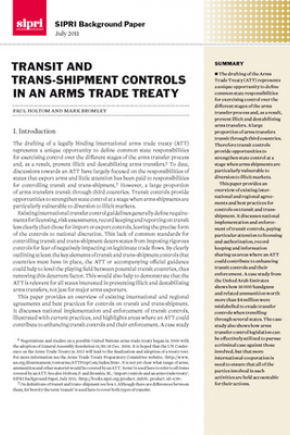Transit and Trans-shipment Controls in an Arms Trade Treaty
The drafting of an arms trade treaty (ATT) represents a unique opportunity to define common state responsibilities for exercising control over the different stages of the arms transfer process and, as a result, prevent illicit and destabilizing arms transfers. A large proportion of arms transfers transit through third countries. Therefore transit controls provide opportunities to strengthen state control at a stage when arms shipments are particularly vulnerable to diversion to illicit markets.
This paper provides an overview of existing international and regional agreements and best practices for controls on transit and trans-shipment. It discusses national implementation and enforcement of transit controls, paying particular attention to licensing and authorization, record keeping and information sharing as areas where an ATT could contribute to enhancing transit controls and their enforcement. A case study from the United Arab Emirates shows how 16 000 handguns and related ammunition worth more than $4 million were mislabelled to evade transfer controls when travelling through several states. The case study also shows how arms transfer control legislation can be effectively utilized to pursue a criminal case against those involved, but that more international cooperation is need to ensure that all of the parties involved in such activities are held accountable for their actions.
I. Introduction
II. International obligations and guidelines
III. National implementation
IV. Transit and trans-shipment controls in an ATT


